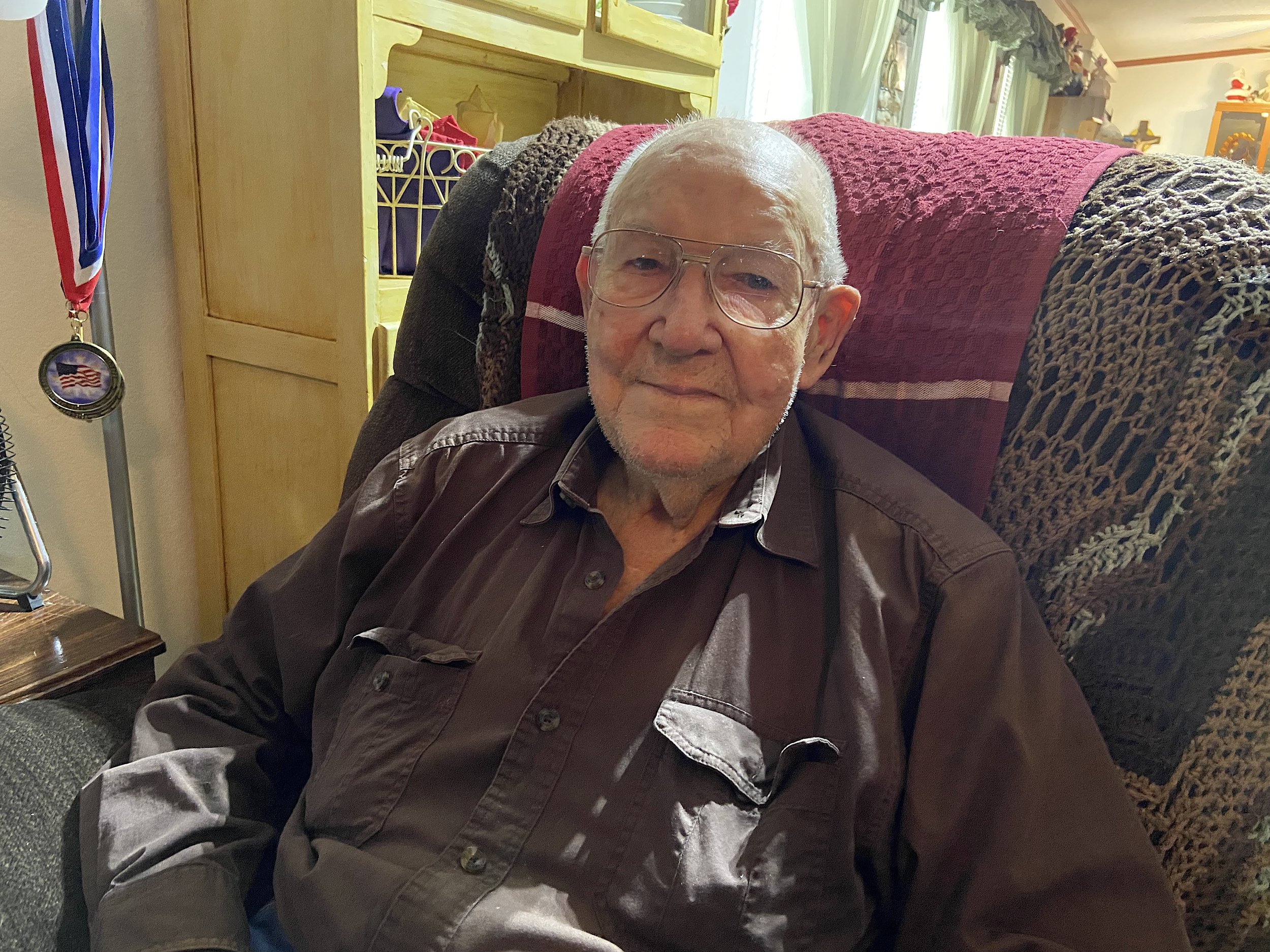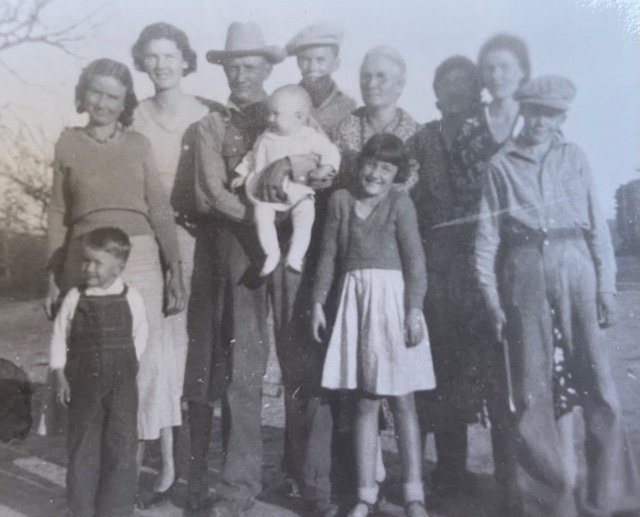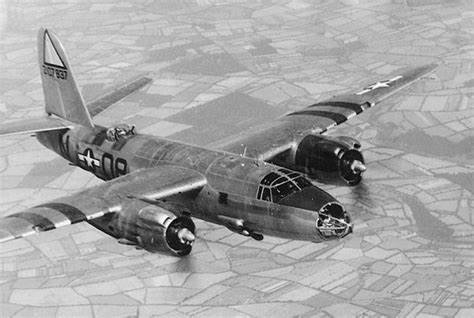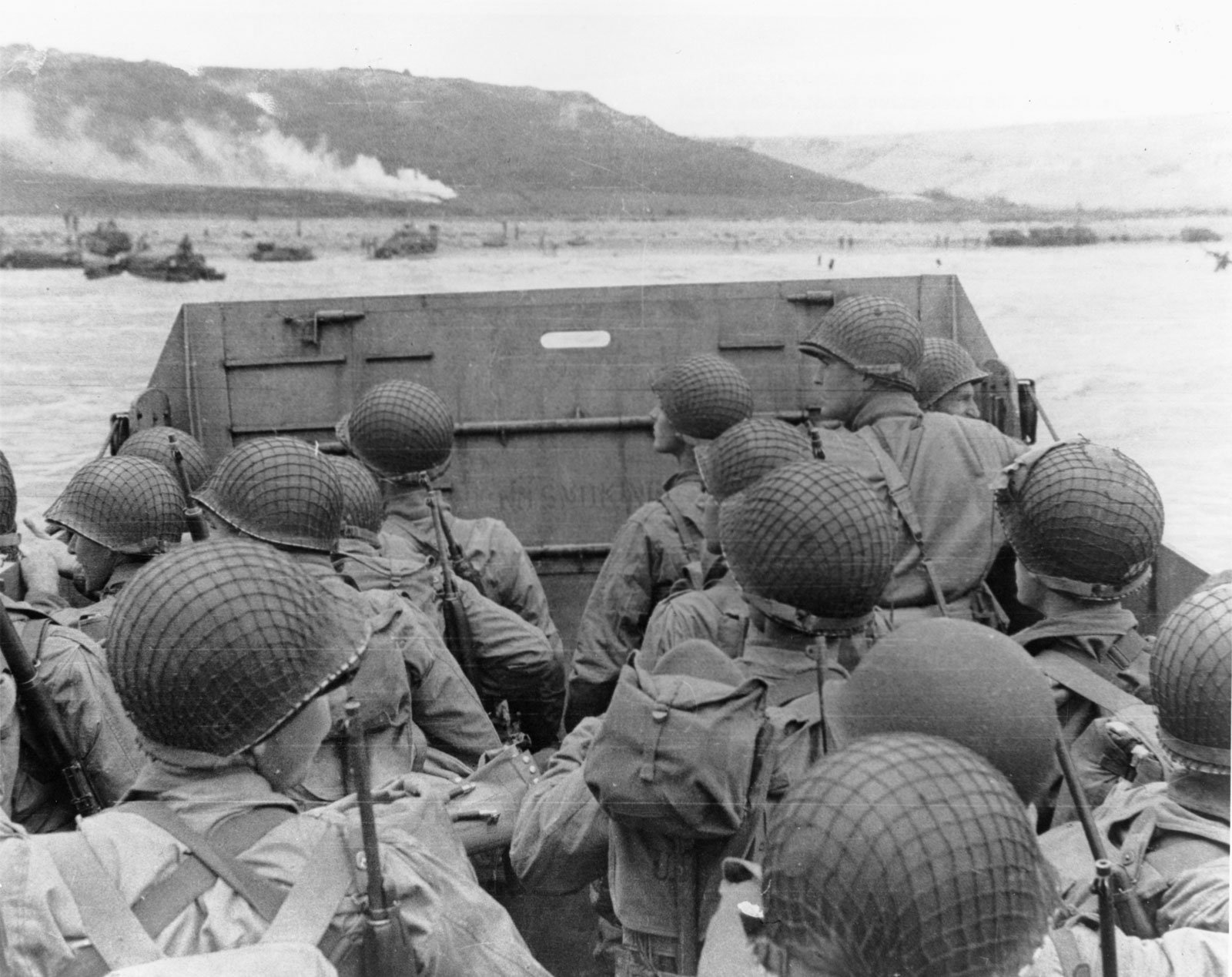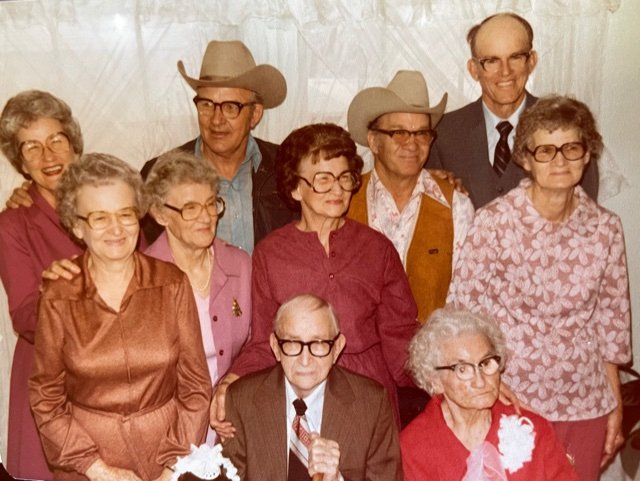Mack Hutchins
Mack Hutchins, U.S. Army Air Corps, World War II
EARLY DAYS
I was born on November 15th, 1922 and I will be 99 years old this year. Mack was born at home five (5) miles west of Alba, Texas. His dad’s name was Edward Zachari or Zakira (Mach wasn’t quite sure how he spelled his dads name) , and his mom was Sadie Hall.
He had seven (7) brothers and sisters. (Johnny on right in this photo). His sisters were Trix, Ara, Bonnie, Mable and Olavee and brothers, Edward, and Johnny His brother Edward also served in the military. He also was in the Army Air Corps and the two of them went in at the same time down in Tyler.
“My dad was a farmer,” said Mack sitting in his home for our interview. “He had about 130-acres where he grew cotton, corn, peas, peanuts and sweat potatoes. Most of the vegetables we ate. If they were not eaten they were put up and canned. Momma was always canning on that old wood cook stove. We had plenty of timber and we cut our own wood. We had two fireplaces. We had a nice peach orchard, apple and cherry tree and a pear tree. We would start getting peaches in June and then some that got ripe in the fall. It was during the depression and I remember those times,” said Mack shaking his head. “We had it hard, but we grew everything we ate and ate everything we grew. We ate like Kings. We never did have much money, but we were never wanting for anything. Dad always felt proud that he never needed any of Roosevelt’s help when he came in as President. He believed in taking care of yourself and your family.
We had a team of mules and a team of mares. Everybody worked on the farm. I was about six or seven when I first started to work in the fields. My mom made me a cotton sack, it had straps, but it dragged the ground a little bit. I started picking on dad’s rows. There was nothing easy about it. My dad had knee pads and he would crawl a lot. I would get down there with him and he would ask me why I was crawling? I couldn’t give him an answer because I didn’t know. I picked about 20 pounds a day of cotton. It was always a lot of cotton for me,” laughed Mack. “When I became a teenager, I could pick 150-pounds a day. My sister, Bonnie, could pick 300-pounds a day. We sold our cotton in Emory at George Alexander’s cotton Ginn in a wagon.
Around the beginning of the Depression, in 1927, my dad bought a Model-T, 2-door touring car. He put a trailer hitch on there and bought a trailer. That is how he started carrying the cotton in. Sometimes he would drop it off in Alba at George McKenzie’s Ginn and if it was crowded he would just park it and leave the keys in it. One time my dad went down to retrieve his car and trailer, he put the key in and smoke came out everywhere. Someone had put a “smoke bomb” in there,” laughed Mack.
SCHOOL DAYS
Mack went to Belview High School (Grades 1-8) out in the country in Raines County, about a mile from our house. The family moved to Alba and he graduated from high school there. I started before Kindergarten age and they called it the “Brimmer.” “I was six or seven when I started. I walked to school every day and in bad weather and dad would come down there and pick us up in the wagon. I would come home and start work on the farm. Everybody had their jobs. We had five milk cows and a bull. We had to take care of about a hundred chickens.
I played center on the basketball team in the ninth grade thru the twelfth. I use to measure 5’10” and a half. My oldest brother, Ed, was 6-foot two. He played center too. We never made it to regionals or state. I played for three years until I graduated. I never did go to college. I took a machinist school in Arlington back in 1942. Most of the employers who looked at my resume would say, “we can’t hire you, you are too close to the draft,” laughed Mack.
“We hunted squirrels in the daytime and at night we would hunt for possums. There were no deer, hogs or coyotes. The possum we caught we would skin em and stretch
them out on a board and when they dried we would carry the hides out to the train depot and send them to Sears & Roebuck. I don’t what they did with them,” laughed Mack. “We had a stock tank on the property and fished that for bream and “mudcats.” My mom would help us clean those mudcats and fry em and she would pick the meat off the bones for the kids. I found out how to fillet a catfish. That was easy. You start behind his gills and go down his backbone, fold that back, get between skin and meat and run that knife down thru there. I will fall off. You need a sharp knife.”
JOINING THE MILITARY
Mack went into the military on October 31st of 1942. Seventy-nine years later, Mack will be 99 in November 2021, he can still tell you what his military serial number was in the Army Air Corps.
I was working on a farm at a friend’s place in San Angelo, Texas making a dollar and a half a day plus room and board. We were all out on the farm and word got out pretty fast about the bombing of Pearl Harbor on December 7, 1941. I came home right after that. I never heard from the draft board but I couldn’t find a job anywhere. Almost everybody was being drafted. I didn’t want to join the “walking Army,” or be drafted. I wanted in the Air Corps. So, me and my brother, Ed, went down to Tyler and signed up for the Army Air Corps. He was two and a half years older than me. Ed got his papers to go and take the physical. He called the board and asked if he could volunteer to go into the Corps and they said yes. Ed already had some experience and knew a little bit about the Army. He was involved with the Civilian Conservation Corps or (CCC) in Colorado for about six months.”
NOTE: The Civilian Conservation Corps was a voluntary public work relief program that operated from 1933 to 1942 in the United States for unemployed, unmarried men ages 18–25 and eventually expanded to ages 17–28. Robert Fechner was the first director of this agency, succeeded by James McEntee following Fechner’s death. The CCC was a major part of President Franklin D. Roosevelt’s New Deal that provided manual labor jobs related to the conservation and development of natural resources in rural lands owned by federal, state, and local governments. The CCC was designed to provide jobs for young men and to relieve families who had difficulty finding jobs during the Great Depression in the United States. Maximum enrollment at any one time was 300,000. Through the course of its nine years in operation, three million young men participated in the CCC, which provided them with shelter, clothing, and food, together with a wage of $30 per month.
“Ed gave me a pointer or two about the Army. Up there at Camp Kilmer in Mineral Wells, they called us all up one day and needed some volunteers as truck drivers. I told Ed we knew a little bit about trucks and that would give us something to do. But, he said, don’t volunteer. A little while we heard something come rattling down the street. Those truck drivers were pushing wheel barrels,” laughed Mack.
“I don’t know why I joined the Air Corps. I guess because I liked airplanes. Ed didn’t want to go into the Army and he wanted to be a mechanic and he became a mechanic in the Air Corps down in San Marcos and never left there. I got home from France about a week before he was discharged. I was in the military for 37-months and seven days,” Mack said emphatically.
“The mood of the country when I went into the military was very patriotic. If you were in the military and you needed to go somewhere you just go out on the highway and somebody would pick you up. You didn’t even need to thumb for a ride. This country definitely supported the war effort going on.
After Ed and I signed up they sent us to Mineral Wells at Camp Kilmer. Ed was shipped out down after a few days and sent down by the coast of Texas and I was sent out a few days later to Hondo, Texas for Boot Camp. I was in good shape when I arrived in Boot. I could do fifty push-ups and didn’t mind all the drilling. We had three weeks of drilling, every day. Like my brother, Ed, I wanted to be a mechanic in the military. When I finished boot I was assigned an aircraft and the crew chief didn’t like me. I worked with the AT-7 trainers and P-34 aircraft and was working in Air Corps Supply in Hondo. I was then sent to San Marcos to work in the KP (Kitchen Patrol) Squadron.
Around July 1st of 1943 we left San Marcos and hopped on a train to Houston and the next night in New Orleans. Around July 4th we arrived in Augusta, Georgia. That place was a “Hell Hole.” We were In a chair car full of soldiers and had no place to sleep on the train. There we had five weeks of overseas training to fight the Germans. We boarded a ship and didn’t tell us where we were going. Our next stop was to Myrtle Beach, South Carolina. There we were formed into the 1074th Quartermaster Squadron. That is what I was in for the rest of the war.
In December of 1943 we boarded a ship and went to New York. We still didn’t know where we were going as the ship left the port of New York. We were on the USS Santa Marta and the day we boarded they we loading the ship with spam. I woke up in the middle of the night I heard a loud bang and the sound of a “Fog Horn.” We were still a couple of feet from the dock. I thought to myself, where is this East Texas “Cottin Picker” going? Leaving out of New York we were all pretty sure we were going to Europe. When we left the port and passed the Statue of Liberty, I was back on the rail, sick. I was sick ten days in a row. We slept 5-bunks high and I was on the bottom and it was miserable. We spent Christmas of 1943 and New Year’s Eve on a ship in the Atlantic. There was 165 of us from the 1074th Squadron on board. There was also less than a hundred Infantry men on the ship.
We left in a convoy of over a hundred ships. We were heading to Europe moving at five knots and that is not very fast. Off the coast of Iceland, we hit a bad storm. We had seas that were fifty-feet high. Our ship was flopping and rattling. When we reached the peak of a wave and dipped down, that water would come clear up to the cabin. I would eat …. and then upchuck it.
On the fifteenth day we could see something way over to the right. We knew it wasn’t water. It was Ireland and we anchored out in the Bay. At this point the rest of the ships left and we were out on the ocean by ourselves, hitting a speed of seven knots. The slowest U-boat Hitler had would go faster than that underwater.
This small boat came along our ship and we threw over a ladder and a pilot came on board. There were a lot of mines in the Bay and this pilot knew how to steer us clear of those mines. We docked in Liverpool and were marched to a train heading to London. It was still dark when we left. We could hear the sirens going off and that was a warning that Hitler’s “Bed Check” was coming. We never stopped in London, we kept going and later that evening we stopped and got off the train. We were then loaded onto trucks and drove and spent the night at an airbase outside of London. (It is January of 1944.)
Hitler intended to blow London off the map. I wasn’t scared as we drove thru London,” said Mack.
“We got to the base and our Quartermaster units job was to furnish food, fuel and clothing. We didn’t have anywhere to pick up supplies. For the first couple of weeks we ate with a Detachment of “limey soldiers” that were on that base. They didn’t have very much to eat. I don’t know how they made it. The soldiers and civilians were all rationed.
Eventually we started getting supplies and set up our own “mess hall.” It didn’t take us long to find out what Hitler’s “bed check,” meant. The sirens went off and we ran outside and fortunately Hitler did not stop at our base. The bombing went on for over a month or so we were there.
I had a friend named Warren G. Long from Florida in our Squadron. We nicknamed him, “lucky.” I had met him in Augusta, Georgia. He liked to gamble and was good at it.
We had a bomb land right near the Quonset hut on the other side of the base. It hit an Englishman’s apple barn and it burned down and a fragment hit thru a tent and thru a cot and hit the floor. It didn’t take Lucky and me long to run out of that sleeping quarters and jump into our “foxhole.”
“We stayed on that base for about 4 or 5 months,” he said. “I usually worked in the “gas dump,” for vehicles. We were responsible of taking care of two bases and at this time they split up our squadron and we were down to about thirty men. That second base was located at Christ Church, also near London. We would get a large fuel truck and we would then pump that fuel into the vehicles from the two bases. All our mail came to the other base and we would have to go and pick it up. They found out I had a driver’s license so I was assigned to go and retrieve the mail. It was about twenty-five miles and I enjoyed the drive, although I had to go after supper. I had a friend from the fuel dump that drove the trip with me one night. We came around this 45 degree turn on a hill and we noticed four men and two of them threw an overcoat across the road just as we came up. When we got close to them I slammed the vehicle into 2nd gear and we slid around that next corner. We had learned later that the Germans had dropped some paratroopers in that area. They were in civilian clothes and I didn’t want to talk to any of them. It probably saved our lives. It scare the *&^% out me,” said Mack. “When we came back that way my friend had a rifle and I had a 45 in my lap and another gun on the side. We were ready for action, but there was nobody there.
“Buzz bombs” would come over now and then. They were fueled for London and some of them were not made at the same college,” smiled Mack. “They sounded like an Allis Chalmers tractor running wide open. If it was coming and that sound stopped you knew you were in trouble. We saw one come over and hit an air pocket and turned around and we got nervous, but it ran out of fuel and exploded outside the base. Those were BIG bombs with engines on them.
We had B-26s on our base and I remember when we were going to breakfast in the mornings the B-17s and 24’s were flying out. They were heading to bombing missions in Germany. They were all in formation and man they looked good. Hundreds of them. When we went to lunch, they would start coming back in. One day we saw this B-17 coming in by itself. He wasn’t very high and wasn’t going very fast. You could see the prop on the left wing, outside prop, was barely turning. The other, inside prop, was swinging under the left wing. The other outside prop on the right wing was barely turning and the inside prop was running like a singer sewing machine. Only one engine was flying that plane. They could have landed at our base but they flew on by. We could see a large hole right in the middle where the fuselage was. I still get goose bumps on my arm and back thinking about those boys flying that plane.
On June 6th 1944 the allies started their push to Normandy with a large armada of military ships and planes. We did not hear anything about the invasion until it happened. “Operation Overlord” was a top-secret mission. Those bombers were taking off from “sunup to sundown” on missions over France during the invasion. All those bombers were sure tough airplanes. They sent out 21-planes one morning from our base in Christ Church and only 11 came back. We had some good bombers but none of them had a tougher plane than our P-51 fighters. It was the fastest plane in the bunch. I talked to some of the mechanics on those planes and they told me it was not surprising for some of those planes to come back with dirt in their lines and still flying.
Our unit was moved off the coast of the English Channel to Perrone, France about a month after the invasion. They moved us over there in a ship or “paddle boats,” laughed Mack. “We had to march seven miles. I had an old WW1 103-rifle, but they were good guns. In my pack I had six hand grenades and a launcher to put on the end of the barrel of the rifle. I was worn out after that seven-mile march. We moved up into an area where they thought there we no Germans. They didn’t want those Germans getting ahold of those airplanes. We had about 25 of those B-26’s in Perone. They were still going on bombing raids day and night. Our job was still to furnish fuel for the base, along with food and clothing. I never got shot at and didn’t shoot anybody. That doesn’t hurt my feelings either.
About the time of the “Battle of the Bulge,” someone came along and said we might not have enough fuel if the German came and broke thru in that area. They hauled gasoline in there with tanker trucks and big trailer tanks. We spent three days and nights straight filling 5-gallon jerry cans and tanker trucks of fuel. We were furnished with five Deuce and a half Jimmy’s to haul canned gas out. The Germans left a lot of gas cans and we picked them up and put gas in them. Me and another friend from our Corps group rode along with those five trucks to make sure they got back to the base. We stopped once to fill up a Frenchman’s gas lantern walking alongside the road. He yelled and pointed to a nearby house and yelled, Vino, vino. We didn’t know what he was talking about. We followed him and the other four trucks followed us. We went to the side of his house and three large barrels were full and we filled up our canteens. That was the best seven quarts of “vinegar” I ever drink in my life.
Just before the war was over we were moved to Holland or Germany, I don’t remember. I do remember those nose and tail gunners on the fighter planes sure were shooting those 50 calibers. They sure were glad the war was over, even the ground troops were shooting their weapons. We were all happy it was over. Then, once again, they moved us right back to Perone, France where we started. There they transferred from the Quartermaster Squadron to the Service Squadron and put me in the supply house.
My 1st Sargeant told me to take a couple of Germans and to go and build a Squadron clubhouse for our guys. So, for the next two weeks that is what I did. He then told me to run it since I built it. So, I did until I accrued enough time, 67 points, to get out of the service and return home. They brought over a load of beer kegs and a load of cognac for the new clubhouse. One of the cases of cognac was so old that if you touched the label it would come off. I took a small taste of it and you talk about mellow. I took a bottle out and put in my duffel bag.
I left France and came home on a ship in December of 1945. I received my discharge on December 6th. Mack then opened his wallet and showed me his discharge papers. He had been carrying them in his wallet for 76 years. ( Says December 6, 1945) Honorable Discharge. I carry them just in case someone asks me for my military discharge. But, nobody today, knows what they are,” Mack said shaking his head.
U.S. President Franklin D. Roosevelt, British Prime Minister Winston Churchill and Soviet Premier Joseph Stalin —met in the Soviet resort town of Yalta to plan for the dawn of the post-war world including the agreement that Russia would attack Berlin.
When the American GI’s like Mack found out about that decision, they did not like it. Patton would have been in a month before the Russians had gotten there.
I was an East Texas cotton picker, that traveled to Europe and fought in a war and made it home. I did what I was told to do. I was never shot at and never shot nobody. I liked the military. I learned a lot about dealing with people. Most of all I learned about love. There were a lot of “snotty nosed” kids that went over there, but thank God a lot of them came back Christians.
When I came back from overseas mom and dad still had the farm in the country. I got off the ship and was loaded on a train in New York and shipped me down to Camp Fanning in Tyler. There was a large table where we had to empty our duffel bag onto. While I was in France I got me four pair of coveralls that fit me perfect. After a big argument, I had to give them my coveralls. We stayed in the barracks overnight and about 11 in the morning they told us to come back in the morning and we would get our discharge papers. I looked at my watch and said, shoot, I got time to make it home. I went downtown and there was a bus getting ready to go to Greenville. I got on that bus and ended up in Alba. Went down there to Luther Cranford’s Drugstore. He saw me and said, hello Mack. I bet your mother and dad will be happy to see me. I told him they thought I was still in France. So, he grabbed his hat and drove me home. Momma was in the front yard stirring a pot of lye soap. Momma saw me and she had a fit and I had a fit. I looked over and dad was coming. We had quite a reunion. That night I took their car and went back to Camp Fanning and got my discharge papers. I was glad to me home.
I went to work for the Ft. Worth National Bank for $75 a month after the war and got married in 1947. My father-in-law was a Mason. I decided I wanted to go into the Mason’s and was with them for 72 years. I also started working with the Boy Scouts and stayed there for 31-years. I then worked for Texas Electric and retired from there after 35 years. I retired on July 31st of 1983.
On November 15th I will be 99 years old. I got a lot of good genes from my parents. Dad was 101 and a half and momma was 6 months from a 100. Ed died at 96. Ara was 103. Olla is 104 and still living. There are only three of us left. Olla, me and Johnny are the only ones still living. Johnny still lives out at our old homestead.
I heard several years ago that WW2 veterans are dying at about 1,000 a day. There ain’t too many of us left.
Mack Hutchins , thank you for your service to our country while serving in the United States Air Corps during WWII. Your courage and bravery will not be forgotten.
NOTE: Meet other Veterans from Van Zandt County by going to the top of www.vzcm webpage and click on MEET OUR VETERANS and click one of the (5) branches of services and the veterans last name first and click to read.
“Every Veteran has a story to tell.” Phil Smith
GOD BLESS OUR VETERANS AND GOD BLESS AMERICA
(ALL photos on this Facebook page are ©2021, Phil Smith and Van Zandt County Veterans Memorial. NO unauthorized use without permission) All Rights Reserved.

